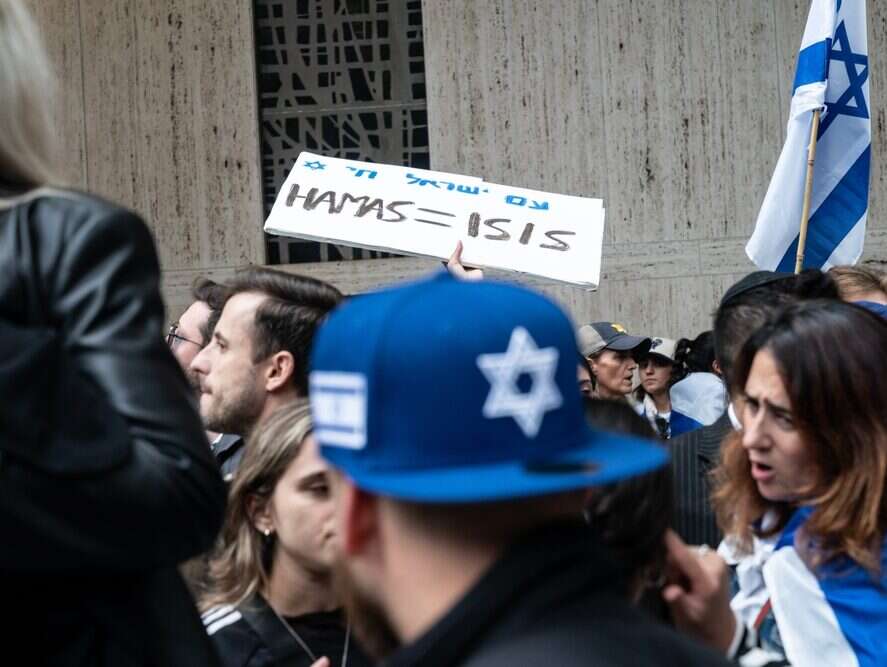
The BBC has defended its decision not to refer to Gaza-headquartered Hamas as “terrorists” in its reporting of attacks which have cost more than 1,000 lives in Israel this week.
The broadcaster has frequently referred to Hamas as “militants” rather than “terrorists” in its coverage since the group launched an attack on Israel from the Gaza Strip on Saturday.
For example, one headline read: “Watch: Israeli festivalgoer kidnapped by Hamas militants.” Another story, written by international editor Jeremy Bowen reporting from Israel, was headlined: “Inside Kfar Aza where Hamas militants killed families in their homes.”
Some news organisations may try to avoid using either word in a headline where nuance is harder to include. But ITV News has referred, without attributing the phrase to a witness or expert, to “terror attacks by Hamas fighters” in its reporting this week.
BBC says word ‘terrorist’ can be a ‘barrier… to understanding’
The BBC said its “longstanding position” has been not to use the word terrorist without attribution, including in previous conflicts between Israel and Hamas in Gaza.
Hamas is a proscribed terrorist group in the UK, meaning it is a criminal offence to be a member or declare support for it. The Government website states: “Hamas commits and participates in terrorism.”
In response to complaints, the BBC issued a statement in which it shared the relevant parts of its guidelines on reporting “war, terror and emergencies”.
They say: “Our reporting of possible acts of terror should be timely and responsible, bearing in mind our requirement for due accuracy and impartiality. Terrorism is a difficult and emotive subject with significant political overtones and care is required in the use of language that carries value judgements. We should not use the term ‘terrorist’ without attribution.
“The word ‘terrorist’ itself can be a barrier rather than an aid to understanding. We should convey to our audience the full consequences of the act by describing what happened.
“We should use words which specifically describe the perpetrator such as ‘bomber’, ‘attacker’, ‘gunman’, ‘kidnapper’, ‘insurgent’ and ‘militant’.
“We should not adopt other people’s language as our own; our responsibility is to remain objective and report in ways that enable our audiences to make their own assessments about who is doing what to whom.”
The BBC also argued it has “made clear the nature of the atrocities committed and the impact this has had on civilians” and that it has explained across its reporting that Hamas is a proscribed terrorist organisation in many countries, including the UK.
“We have reflected the response from the international community to Hamas’ actions, and featured contributors who have described them as terrorists,” it said.
“We have given careful consideration to all aspects of our reporting of the Israel-Gaza conflict, both in terms of Hamas’ attacks and Israel’s response – this includes the language that we use. The BBC is editorially independent; our role is to explain precisely what is happening so that the public can make their own judgements.”
Grant Shapps questions BBC’s ‘moral compass’
British MPs have been among those calling on the BBC to change its terminology. Defence Secretary Grant Shapps told LBC the BBC needs to fix its “moral compass” and it was “verging on disgraceful, this idea that there is some sort of equivalence, and they’ll always say well there’s two sides…”
Shapps added: “They are not freedom fighters, they are not militants, they are pure and simple terrorists, and it’s remarkable to go to the BBC website and still see them talking about gunmen and militants and not calling them terrorists.” Other ministers such as Foreign Secretary James Cleverly and Culture Secretary Lucy Frazer have shared a similar view.
Labour leader Keir Starmer told LBC that the BBC “needs to explain” why it was not using the word terrorist, as to him terrorism is “obviously what we are witnessing”, but acknowledged that it was not the only channel to have made that decision.
Meanwhile longtime BBC correspondent John Simpson defended the broadcaster’s position. He wrote on X/Twitter: “British politicians know perfectly well why the BBC avoids the word ‘terrorist’, and over the years plenty of them have privately agreed with it.
“Calling someone a terrorist means you’re taking sides and ceasing to treat the situation with due impartiality.
“The BBC’s job is to place the facts before its audience and let them decide what they think, honestly and without ranting. That’s why, in Britain and throughout the world, nearly half a billion people watch, listen to and read us. There’s always someone who would like us to rant. Sorry, it’s not what we do.”
He added that BBC journalists were told at the outbreak of World War Two that they must be “frank and honest, it said — and above all there must be no room for ranting. Wise words, entirely applicable today.”
Twitter’s community notes feature, which allows users to add clarifications under posts they believe to be misleading, saw a note added under Simpson’s post to point out that the BBC’s editorial guidelines say: “Due impartiality… does not require absolute neutrality on every issue or detachment from fundamental democratic principles, such as… the rule of law.”
However this is not from the specific section of the guidelines relating to war, terror and emergencies.
A BBC spokesperson said: “We always take our use of language very seriously. Anyone watching or listening to our coverage will hear the word ‘terrorist’ used many times – we attribute it to those who are using it, for example, the UK Government.
“This is an approach that has been used for decades, and is in line with that of other broadcasters. The BBC is an editorially independent broadcaster whose job is to explain precisely what is happening ‘on the ground’ so our audiences can make their own judgment.”
Email pged@pressgazette.co.uk to point out mistakes, provide story tips or send in a letter for publication on our "Letters Page" blog
